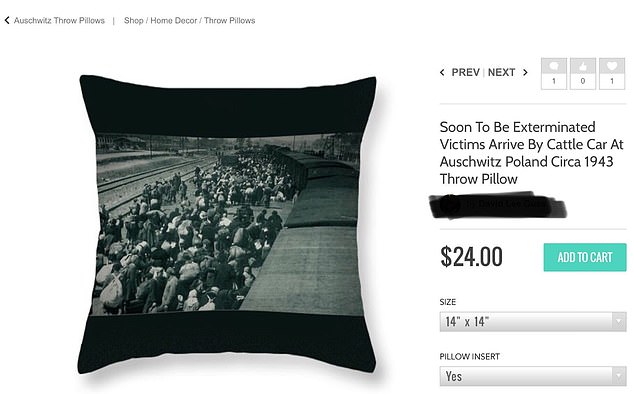The internet is a thing of wonder and has made it possible for people to do all sorts of things that would have been inconceivable just a generation or two ago.
One of those things is that it offers a variety of websites whose purpose is to help people put their art out into the world and be seen and/or purchased by people who would never have come into contact with it otherwise. Sounds great, doesn’t it?
The drawback, however, is that much like on social media platforms, the things which are being offered up for public consumption can sometimes be pretty extreme in terms of content. Sometimes, many people would even call it offensive.
Over the last several months, for example, the staff of Auschwitz Memorial have taken several websites to task for offering items for sale which have images from the concentration camp printed on them.
Yes @FineArtAmerica @shoppixels. It’s probably a complicated automatic system where people are able to upload their works.
However, some verification could help as sometimes things go beyond just a bad taste & become disrespectful. Especially when images of victims are there. pic.twitter.com/Hsoe1HBj1Z
— Auschwitz Memorial (@AuschwitzMuseum) August 21, 2019
Back in the spring the Memorial called Australian eCommerce site Redbubble was challenged for selling tote bags, min skirts and pillows that had black and white prints of Auschwitz and the railroad tracks leading to the gas chambers at the Birkenau extermination camps. Consumers who saw the products were outraged and alerted the staff at the Memorial.
As outrageous as it was to offer and sell designs based on the camps where millions were put to death during World War II, the Daily Mail reported that Redbubble was outdone just this month by two other websites, fine Art America and Pixels.
The Memorial condemned those two sites who were selling phone cases and cushions printed with pictures of actual victims from the camp.
In the case of Redbubble, when the items were drawn to the site’s attention, they took immediate action to remove the items in question and any others of a similar nature. The said that the content was not acceptable and they, as a company, took a strong stance against racism and violence in all its forms.
The site allows users to upload content of their own design, but the company says that they scan new content regularly for offensive images and that their company guidelines prohibit designs that glorify violence.
The situation with Fine Art America and Pixels is a little bit different. These companies aren’t simply a sales mechanism for sellers, they actually do the printing, framing, and distribution of the products they offer, even if the designs don’t originate from them.
In a tweet a couple of days ago, the Auschwitz Museum and Memorial said that while, yes, there is probably a complicated and automatic system for users to upload heir their designs, that the companies could employ some sort of verification or oversight, and that the images in question were not only in poor taste, they were also disrespectful.
The iPhone cases and pillows have been removed from FAA and Pixels, but the sites remain rife with other products full of imagery related to the Third Reich and other evil regimes, such as that of Kim Jong-un and Joseph Stalin.
The nature of the sites is such that those images can be put on a wide variety of available items including not only the hotly-protested iPhone cases and pillows, but also yoga mats, beach towels, and shower curtains.
Pixels owns FAA and the products on the two sites are largely interchangeable both in terms of what they offer and price points.
They bill themselves as the world’s largest print-on-demand technology companies, producing items using sellers’ uploaded designs which they create, finish, package and ship. They also take care of billing and distribute profits to the artists whose work is used. Neither company made any comments about this issue as of yet.
The upsurge of this sort of problem does raise some interesting questions, though, about what constitutes art, about where the line is between artistic expression and simply promulgating hate, and about who needs to take responsibility for it, and how. It is pleasing to report that one of these companies have withdraw the product range.
Another Article From Us: The Netherlands Launch Effort to Find Photos of U.S. Soldiers
